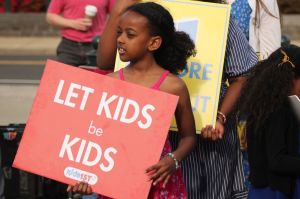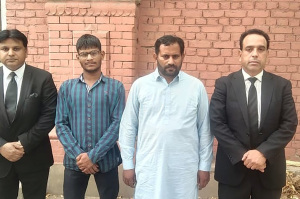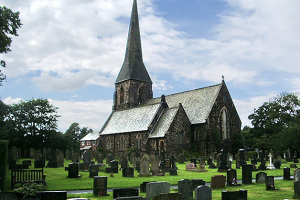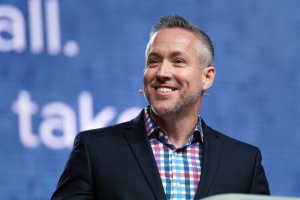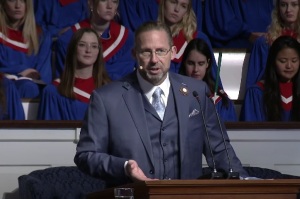Presidential Candidates Asked to Commit to Upholding Religious Freedom by Signing Pledge
Open Doors USA Presents Presidential Pledge for Religious Freedom to White House Hopefuls
Open Doors USA is calling on politicians of every stripe to sign the Presidential Pledge for Religious Freedom to help uphold the rights of believers and nonbelievers at home and abroad and send a resounding message that the United States "considers religious freedom important to the flourishing of a civil society."
The pledge, authored by Dr. Thomas Farr and Dr. Carl A. Moeller, is being presented to all presidential candidates and begins: "I PLEDGE that I will protect religious freedom in full for all Americans, and will advance international religious freedom as part of American foreign policy."
The three points to the pledge ask candidates to commit to the First Amendment and its application to believers and nonbelievers; promise to nominate judges to the U.S. federal bench who are committed to protecting the religious rights of all Americans; and make the promotion of religious freedom a foreign policy priority in his or her administration.
"Religious freedom is in global crisis," Farr said in a statement. "In the United States, religious associations are at risk of being forced either to abandon their core beliefs - for example, on the sanctity of human life – or cease operation."
Farr, visiting associate professor of Religion and International Affairs at Georgetown University's Edmund A. Walsh School of Foreign Service, told The Christian Post Monday that it was vital to highlight issues of religious freedom in the U.S. because of efforts among those in positions of authority to "remove religious voices from American democracy."
Farr, giving an example, pointed to "Judge Vaughn Walker's reasoning in overturning California's Prop 8 referendum included the assertion that religious and moral arguments against gay marriage are, in effect, irrational and therefore unconstitutional. If this reasoning were accepted, it would mean that religious arguments, and religiously-informed moral judgments, would be banned from our public debates, thereby ceding the field entirely to aggressively secular and anti-religious arguments. This would not be good for America's citizens that are Muslim, Jewish, Christian, Buddhist, or adherents of any other religion, whose views of justice, freedom, equality, and the common good are influenced by their religious beliefs. Removing religious voices from our discourse would be unconstitutional and harmful for the country."
As for foreign interests, Farr noted: "Since the passage of the 1998 International Religious Freedom Act, the United States has been required to advance religious freedom abroad. It has done so sporadically and anemically. Given that tens of millions of people, including Christian minorities, are suffering the effects of violent religious persecution (e.g., torture, rape, disappearance, unjust imprisonment, unjust execution), the U.S. should be doing a better job. This is first of all a humanitarian crisis. But it also has serious national security implications. Without religious freedom, democracy will fail to take root in the Middle East. And religious freedom can act as a counter to religion-related terrorism. For all these reasons US IRF policy should be a top priority for the Obama administration. But it is not."
The Georgetown professor said that he found it odd that "none of the Republic candidates for president have had much to say about these problems." He hopes the pledge will change that.
When the U.S. fails to speak out on issues regarding religious freedom in other countries, the nation risks "losing its moral authority," Lindsay Vessey, Open Doors USA's Advocacy Director, told CP.
At a time when candidates seem more likely to use faith as a "political tool," the public pledge will help to ensure that whomever enters the White House will stand by his or her commitment as outlined in the pledge, assuming the newly-elected official signs the document, Vessey said.
Dr. Richard Land, president of the Southern Baptist Conventions Ethics & Religious Liberty Commission has voiced his support for the pledge, saying that the decline of religious freedom around the world "should be a matter of great concern for all people."
In a statement published on the ERLC's website Monday, Land wrote: "We need to face the fact that unless the various communities of faith in the U.S. come together with a clear message and a unified effort, the plight of millions of people around the world whose right to freely express their faith will not improve."
He added, "The 2012 presidential election provides a tremendous opportunity to raise awareness of this critical issue. ... I am pleased that Open Doors USA is requesting each of the presidential candidates to sign a pledge to maintain religious freedom for all Americans and to 'advance international religious freedom as part of American foreign policy’."
Echoing Vessey's comments, Land told CP Monday that ensuring religious freedom for all is a part of the United State's value system. "America is not just a country, we're a cause," he said, adding that all people should hold freedom of religion as a universal value.
Open Doors USA reports that former Pennsylvania Sen. Rick Santorum was the first candidate to sign the pledge, which was being circulated more widely today, Vessey said.
Among those listed as "considering" the pledge are Michele Bachmann, Herman Cain, Newt Gingrich, Jon Huntsman, Gary Johnson, President Barack Obama, Ron Paul, Rick Perry, and Mitt Romney.
The Presidential Pledge for Religious Freedom's endorsers include: Catholic League for Religious and Civil Rights, The International Institute for Religious Freedom of the World Evangelical Alliance, National Hispanic Christian Leadership Conference, and dozens of other organizations, institutions and individuals.
Members of the general public are also encouraged to sign a petition that "urges presidential candidates to sign the pledge."
Open Doors USA is a nonprofit and the organization does not endorse political candidates.
















